We don't need to tell you that a vegan diet is overwhelmingly good for your body.
You're probably already aware that it's been proven to be true time and time again, with health professionals from esteemed cardiologists to dietetics experts promoting the health benefits of a plant-based diet for people of all ages, backgrounds, genders, and activity levels.
But what if you have specific health or lifestyle requirements?
In this guide, we'll break down how can you make sure you are getting all the nutrients you need following a plant-based diet, listing the essential and recommended supplements you may want.
TABLE OF CONTENTS
- Why Do Vegans Need To Take Supplements?
- What Supplements Should Vegans Take?
- The Essentials
- The Boosters
- Buyers Guide
- Recommendations For Goals & Lifestyle
- Kids
- Prenatal & Pregnancy
- Collagen
- Joint Health
- Probiotics
- Workout & Bodybuilding
- Weight Loss
- Gummys
- FAQs
- Conclusion
Looking to buy vegan supplements as well? Browse the range now
Why Do Vegans Need To Take Supplements?
If you follow a nutritionally dense, health-promoting whole foods plant-based diet, you are already getting the majority of the micronutrients your body needs to thrive. In fact, vegan diets tend to contain higher levels of potassium, vitamin C, vitamin A, vitamin E, and manganese compared to conventional diets.
At the same time, there are a few key nutrients that aren't easily found in a plant-based diet, plus poorly planned vegan diets can contain lower levels of essential nutrients.
What Supplements Should Vegans Take?
While we recommend all vegans get their blood work done at regular intervals to check potential nutrient deficiencies, there are some vitamins and minerals that vegans should supplement no matter what, as they cannot be obtained from plant foods alone.
The Essential Range of Vegan Supplements
When it comes to essential micronutrients, experts have recognized that vitamin B12, vitamin D, iodine, and DHA and EPA omega-3 fatty acids are the four nutrients most likely to be lacking from vegan diets.
So, taking a vegan supplement is the only way to make sure you are meeting your recommended levels!
Shop For An Essential Vegan Multivitamin (B12 + Omega 3 + D3)
Vegan B12 Supplements
Vitamin B12, aka the infamous vitamin you have probably been taunted with since the day you announced you were going vegan, is a water-soluble vitamin that holds two really important functions: maintaining the structure of our nervous system and helping with the production of red blood cells. Along with folic acid, vitamin B12 is essential to utilize the iron in our bodies and to release energy from the food we consume.
Why vegans need to take vitamin B12
B12-producing bacteria used to be ubiquitous in soil and water in pre-modern times, but pesticides and other modern agricultural practices, as well as animal agriculture standards moving away from grass-feeding, have ultimately cut down this bacterial population. Today's cattle are given B12 supplements to make up for the lack of natural sources, so vegans who do not consume any animal products can simply skip the cow and supplement directly!
Fortified foods such as nutritional yeast, soy milk, marmite (yeast spread), and vegan meat substitutes also contain supplemented B12, but they are not considered a reliable source of the nutrient.
In extreme cases, vitamin B12 deficiency can severely impact our nervous system by causing vision impairments and memory loss, so getting enough on a daily basis is essential when going vegan!
Shop For A Vegan B12 Spray
How to get vitamin B12 without a supplement
The fact that there aren't any natural plant-based sources of B12, as it is produced by bacteria, means that getting vitamin B12 without supplementation is not recommended.
Although experts admit that it may be possible to get enough B12 from fortified dietary sources like nutritional yeast, supplementing remains the easiest and cheaper way of getting your B12.
How much vitamin B12 should a vegan take
The RDA for adults is approximately 2.4 mcg per day, but vegan health experts recommend going well over this amount as B12 is not efficiently absorbed by the body. In fact, a dosage of around 1000mcg is generally considered the most efficient when treating B12 deficiency, and most supplement brands will offer a daily dosage between 500mcg and 2000mcg.
Future Kind's Vegan B12 spray features the methylcobalamin form of B12, which is often regarded as the most bioavailable form of the nutrient compared to the popular adenosylcobalamin.
Vegan Omega-3 Supplements
Omega-3s are often overlooked when talking about nutrients and vitamins for vegans, but these long-chain fatty acids are essential for protecting your body against heart disease by curbing inflammation, regulating "good" cholesterol, and reducing blood pressure. On top of that, getting enough omega-3 fatty acids is important for optimal brain and liver function.
There are three main types of dietary omega-3s: EPA and DHA (found in seafood and fish), and ALA (alpha-linolenic acid), found in high-fat plant foods.
Why vegans need to take DHA and EPA omega-3
DHA and EPA omega-3 are essential for our body to function, as they support cardiovascular and cognitive health, while ALA fatty acids don't seem to bring the same health benefits. Even though those on a plant-based diet can get their long-chain omega-3s through sea vegetables, taking a supplement is considered a more reliable option when accounting for the varying levels of omega-3s in seaweed.
Shop For A Vegan Omega 3 Supplement
How to get DHA/EPA omega-3 without a supplement
Vegan sources of ALA omega-3 fatty acids include chia seeds, hemp seeds, flaxseeds, and to a minor extent Brussels sprouts. Unfortunately, your body cannot easily convert ALA omega-3 fatty acids into EPA and DHA, and you would need to eat several servings of these foods a day to get enough.
Non-vegan sources of DHA/EPA include fatty fish, oysters, and fish oil, as these animals eat omega-rich algae to get these nutrients. Those who wish to skip the fish (and the mercury!) and go straight to the source would have to eat sea vegetables, with seaweed varieties like kelp and nori being some of the best sources.
How much DHA/EPA omega-3 should a vegan take
Although there is no set RDA for these fatty acids, both the World Health Organization and the European Food Safety Authority recommend a minimum of 250–500 mg combined EPA and DHA per day for adults (the RDA for ALA omega-3 is instead set at 1.1 to 1.6g for adults).
Vegans can get their omega-3 from an algae-based DHA supplement like Future Kind's Vegan Omega-3, providing 275mg of combined EPA/DHA omega-3s per serving.
Vegan Vitamin D3 Supplements
Vitamin D is a fat-soluble vitamin produced through sun exposure, assisting in the absorption of calcium, insulin regulation, and overall support of the immune and nervous systems. Vitamin D is actually a cluster of vitamins: vitamin D2 and D3 are the two most common vitamin D types found in diets — the former found in fortified foods like breakfast cereal and UV light-grown mushrooms, while the latter can only be found in animal products such as egg yolk, liver, butter, and fish oil.
Why vegans need to take vitamin D3
There is a solid body of research suggesting that vitamin D2 may be less effective than vitamin D3 at raising blood levels of vitamin D, hence why vegans are recommended to supplement D3 instead. This form of vitamin D has also been shown to reduce premature mortality, making D3 the preferred option to supplement for all. Getting enough vitamin D from natural sunlight can be tricky, and as the only dietary sources of D3 are animal products like fish and eggs, vegans should get their vitamin D through supplementation.
How to get vitamin D without a supplement
Vitamin D is produced by the body naturally through sun exposure.
Sunlight on bare skin for approximately 10 minutes, two or three times per week, will allow most people to produce sufficient vitamin D for what their body needs during the summer. However, vitamin D tends to break down quite quickly, meaning that body stores can run dangerously low over the winter, especially in parts of the world that are frequently overcast and particularly in people with darker skin tones.
This is why everyone, regardless of their dietary habits, is recommended to supplement vitamin D!
Shop For A Vegan Vitamin D3 Supplement
How much vitamin D should a vegan take
Vegans should get their vitamin D3 through either fortified foods like vegan cereal or, even better, through supplements. The RDA for vitamin D sits at around 10mcg per day for adults.
Note that the overwhelming majority of vitamin D supplements on the market will offer non-vegan vitamin D obtained from sheep's wool (lanolin), so checking the ingredients label thoroughly is crucial!
Future Kind's Essential Multivitamin contains 50mcg/2000IU of plant-based vitamin D3 per serving, giving you all the vitamin D you need on a vegan diet, no matter how much sunshine you might get on a daily basis!
Vegan Iodine Supplements
Iodine has recently been on the news as one of the trickiest nutrients to get on a vegan diet, thanks to a German study finding that one-third of the surveyed vegans had a lower iodine excretion than the WHO threshold value for severe iodine deficiency.
So, why are vegans falling short and what can they do about it?
Why vegans need to take iodine
Iodine is an essential water-soluble trace element needed for healthy thyroid function, responsible for regulating hormones and metabolism. It helps make thyroid hormones, crucial in brain development and growth processes as well as indispensable for metabolic function.
As plant-based iodine-rich foods are quite rare, vegans who are struggling to meet the RDA are recommended to carefully use a supplement until their levels are back on track.
Shop For A Vegan Iodine Supplement
How to get iodine without a supplement
Sea vegetables and iodized salt are the only reliable iodine-rich foods for vegans.
Seaweed varieties like laver, dulse, and alaria, usually found in convenient seasoned sheets are generally considered reliable sources of vegan iodine – as long as you don’t eat them every day!
How much iodine should a vegan take
The recommended amount of iodine is 150mcg per day for adults, jumping at 220mcg per day for pregnant women and 290mcg for lactating women due to the importance of iodine in fetal brain development. Taking iodine supplements can often be tricky as too much can be just as dangerous as too little: an intake of 1000mcg should be considered the maximum upper limit!
Future Kind's Liquid Iodine Drops provide 150mcg of iodine per serving, making them the ideal choice for looking after your thyroid health.
Product Highlight: Future Kind's Vegan Multivitamin
Here at Future Kind we call the first three nutrients the must-have essentials for vegans. So, we’ve decided to combine them into one daily vegan supplement for ease of use: introducing the Essential Multivitamin for Vegans! This is a clean option free of additives, designed to only get you a safe and adequate amount of the vegan essentials (omega-3, vitamin D, and B12) so you can look after your body and health with just two easy-to-swallow pills per day.
This multivitamin contains everything you need on a vegan diet, skipping the superfluous. It offers a healthy dosage of 400mcg of B12, ensuring that your red blood cells are taken care of, plus an unbeatable dosage of 650mcg of algae-derived, pollutant-free vegan DHA and EPA omega-3. Unlike 99% of other products on the market, our vegan D3 (50mcg) is made from the plant lichen.
All in all, this is the perfect product for vegans who won't settle for less than the absolute best when it comes to a healthy body and a healthy mind!
The Booster Range of Vegan Supplements
On top of the bare essentials, some people on a plant-based diet might want to boost their levels of non-essential nutrients. While a whole food plant-based diet can get you the majority of nutrients you need to feel your best, some vegans may choose to supplement for macronutrients and micronutrients that require some additional diet planning.
These are the nutrients that health-conscious vegans might want to get more of, according to the latest science!
Vegan Plant-Based Protein Powders
"Where do you get your protein?" is hands-down the most frequently asked question vegans get on a daily basis, and while it may seem obnoxious to most of us, there are reasons for this concern.
According to a 2019 study, vegans suffer a modest risk of inadequate protein intake compared to vegetarians and meat-eaters, so while the concern for protein deficiency is surely overstated, those on a plant-based diet should be mindful of their daily protein intake. If your diet doesn't include enough legumes, nuts, and seeds, reaching for a vegan-friendly protein powder should easily get your levels to where they need to be.
Why vegans need to take a protein powder
Vegans who do not get enough protein from whole foods, whether because they are too busy to plan their diet adequately or struggle to enjoy legumes and other plant-based sources, need to take a high-quality protein powder to make up for it.
How to get plant-based protein without a supplement
Legumes like lentils and beans are considered the best sources of vegan protein, boasting between 12g and 8g of protein per half-cup serving. Soybeans, white beans, borlotti beans, and pinto beans come out on top as the most protein-rich.
Nuts and seeds, especially flaxseeds, chia seeds, and almonds are also great sources of protein for those on vegan diets.
How much protein powder should a vegan take
The RDA for protein sits at around 0.8g per kilogram of body weight per day, while those looking to build muscle and strength train should aim for approximately 1.6g per kilo instead.
If you decide to incorporate a protein powder into your daily routine, you should calculate what your body needs based on these guidelines. Future Kind's Protein Powder is a 100% organic and delicious option for getting your daily plant-based protein, boasting a generous 20g of protein per serving (plus calcium and iron for pre-workout and post-workout energy support!).
Vegan Vitamin C Supplements
Vegan diets are naturally rich in the antioxidant vitamin C but if you are not getting enough whole foods like oranges, carrots, strawberries, and sweet potatoes in, you might do well with a vitamin C supplement.
Why vegans need to take vitamin C
Vitamin C is essential for supporting your immune system, repairing cells, and protecting your body from dangerous free radicals. An adequate vitamin C intake is also especially crucial for vegans as it boosts iron absorption, a key benefit when we consider that non-heme iron is believed to be harder to absorb.
How to get vitamin C without a supplement
There are many plant sources for vitamin C, so it'll be quite easy for vegans to get enough if they incorporate plenty of citrus fruits, potatoes and sweet potatoes, broccoli, Brussels sprouts, peppers, and strawberries into their diets.
How much vitamin C should a vegan take
The RDA for vitamin C sits at around 90mg - 75mg per day, so if you are struggling to get enough from whole food plant sources, a supplement like Future Kind's Liposomal Vitamin C should take care of all your immunity needs with a whopping 1000mg per serving.
Note that as a vegan you are recommended to go well over the RDA to boost iron absorption, so a vitamin C supplement may be needed even if you already eat plenty of veggies and fruit!
Vegan Creatine/Amino Acid Supplements
If you are an athlete or someone passionate about achieving optimal fitness, you might be looking into the amino acid creatine to boost your performance. Studies show that incorporating creatine into your daily regimen can help maximize exercise performance and boost rehabilitation after injury.
But is there such thing as vegan creatine?
Why vegans need to take creatine
Creatine can only be found in animal products like red meat and poultry, as it is an amino acid found in animal tissue. Even though your liver makes creatine and it is a non-essential amino acid, plant-based people who are looking to supplement for enhanced endurance and performance should rely on high-quality supplements.
How to get creatine without a supplement
Vegans cannot get creatine without taking vegan-friendly supplements.
How much creatine should a vegan take
As a non-essential amino acid that is already produced by the body, there is no set recommended daily amount for creatine. However, vegans and vegetarians do tend to have lower concentrations of creatine in their muscles, so taking 3-5g daily (maintenance dose) might give you the results you are after.
Everyone can experience nutrient deficiencies, no matter if they follow a vegan diet or a meat-heavy one! If your most recent blood test has shown a deficiency or suboptimal levels of a key nutrient, you should start supplementing to get your levels back on track.
In this section, we'll go through the vitamins and minerals you may not be getting enough of if you suffer from a condition (for example, pernicious anemia) or follow an inadequate diet.
Vegan Magnesium Supplements
Magnesium is, at least theoretically, not a hard mineral to get on healthy diets, yet deficiencies are extremely common.
Inadequate levels of magnesium can lead to sleep disturbances, anxiety, and decreased energy and muscle function, so if you've been experiencing these issues magnesium deficiency may be the culprit!
Why vegans need to take magnesium
Those on a plant-based diet have been found to have better magnesium status than most, but that doesn't mean that vegans should not make sure they're getting enough. Magnesium is naturally found in the soil, so knowing how much of the mineral is in the foods you eat can be quite hard.
If your recent blood tests have found low magnesium levels, you should consider supplementing until they are back to where they need to be!
How to get magnesium without a supplement
Magnesium can be found in plant-based foods like beans, tempeh, tofu, flaxseed, spinach, and swiss chard. If you are struggling to get enough magnesium-rich foods on a daily basis, a supplement will guarantee better nerve health and optimal absorption.
How much magnesium should a vegan take
An adequate magnesium intake for adults should be around 400-310mg per day, an amount that can be easily reached by taking a vegan-friendly supplement like Future Kind's Vegan Magnesium, coming in the most bioavailable form of the nutrient (magnesium glycinate) and providing 200mg per serving.
This is one of the safest amounts considering that vegans tend to naturally eat enough magnesium-rich foods and that excessive magnesium intake has been linked to diarrhea, nausea, and cramping.
Vegan Iron Supplements
Iron is an incredibly important mineral for your overall health, as it is the main component of hemoglobin, the protein in red blood cells that transports oxygen from the lungs to the rest of the body. Iron deficiency anemia is a common issue affecting primarily women and children.
Why vegans need to take iron
Iron comes in two main forms: heme (found in animal products) and non-heme (found in plant foods). The latter is not as efficiently absorbed and used by the body, so those avoiding meat products should make sure they are getting enough through their diet or supplementation.
How to get iron without a supplement
Iron can be found in vegan foods like beans, lentils, tofu, spinach, and fortified foods like breakfast cereal and sliced bread. Vegans should aim to go over the minimum recommended amount to make sure they are absorbing what their body needs.
How much iron should a vegan take
The RDA for iron sits at around 8mg per day for adult men and 18mg per day for adult women, but those avoiding heme iron sources should aim to get higher daily amounts to ensure adequate absorption. Alternatively, vegans can boost non-heme iron absorption by consuming sources of vitamin C alongside iron-rich plant foods.
Future Kind's Iron + Vitamin C is a great option for vegans (especially vegan women) who experience lower levels of iron, as it is optimized for boosting absorption and provides 18mg of iron per serving.

Vegan Supplement Buyers Guide: What To Look For When Buying Vegan Supplements
With so many different products available on the market, knowing what supplements will truly make a difference for your health can be quite hard.
If you don't know where to start and are stuck on endless browsing, here's a list of features to look out for!
Vegan Vitamin Brands Requirements
3rd party testing
Bias can be dangerous, especially when it comes to medicine and nutrition.
When looking for the perfect multivitamin or nutrient supplement, you should make sure the brand carries out independent 3rd party testing for all its products for added safety.
Non-Toxic Fillers
Most supplements brands on the market will fill their products with unnecessary, possibly toxic bulking ingredients that make the products cheaper to produce. When choosing a supplement, make sure fillers are kept to a minimum, and steer clear of controversial ingredients like magnesium silicate and titanium dioxide!
Vegan Capsules
Lastly, make sure that the supplement capsules are free from hidden animal products like gelatin, animal glycerol, and carmine.
Vegan Supplement Recommendations: Based On Your Goals & Lifestyle
Your specific nutrient requirements will vary according to your age, gender, activity levels, and overall lifestyle, so it's always best to choose supplements that will cater to your unique needs!
Here is what we recommend for specific target demographics that may need supplementation the most.
Vegan kids vitamins
If your children don't eat meat, dairy, and eggs, they will have the same nutrient requirements as vegan adults, with the only difference that they'll need much lower amounts.
What are the benefits of vegan kids vitamins?
Choosing vitamins designed for vegan kids will ensure that they are getting adequate amounts of vitamin B12, vitamin D, iron, and non-ALA omega-3, as their requirements as vegans are higher than kids who eat meat, dairy, and eggs.
How many vitamins should a vegan kid take?
A good multivitamin will take care of the majority of your children's nutritional needs. Just make sure it contains enough vitamin B12, vitamin D, and omega-3 fatty acids — if not, have them supplement these nutrients separately.
The Best Vegan Kids Vitamins Brands
Based on the latest Amazon reviews, these are the top vegan kids vitamins in 2020.
- OmniVegan Kids Multi
- VegLife Vegan Kids Multi
- Smarty Pants Kids Formula
Vegan prenatal & pregnancy vitamins
Expecting and vegan? You'll want to make sure nutrient deficiencies are kept at bay.
What are the benefits of vegan prenatal vitamins?
Taking prenatal supplements is essential to make sure you're getting your baby all that it needs: iodine, B12, omegas, vitamin B complex, iron, calcium, and more!
How much vegan prenatal should a vegan take?
A vegan woman should take a vegan prenatal multivitamin every day, making sure to consult with her doctor first.
The Best Vegan Prenatal Vitamins Brands
Based on the latest Amazon reviews, these are the top vegan prenatal vitamins in 2020.
- Future Kind Vegan Prenatal
- Actif Organic
- Garden of Life Prenatal
Vegan collagen (hair, skin, and nails) vitamins
Real vegan collagen has yet to be available on the market, but vegan collagen boosters are all the rage.
What are the benefits of vegan collagen?
A vegan collagen booster can help you repair cell damage, improving your skin and hair health while making you look younger at the same time.
How much collagen should a vegan take?
Taking a serving once or twice per week will give you visible results.
The Best Vegan Collagen Brands
Based on the latest Amazon reviews, these are the top vegan collagen brands in 2020.
- Future Kind Collagen Booster
- Amazing Grass GLOW
- Sunwarrior Collagen
Vegan joint supplements
Joint pain can strike anyone, no matter their age. Taking a supplement can help boost mobility and relieve pain so you can feel more like yourself again!
What are the benefits of vegan joint supplements?
Glucosamine helps slow the deterioration of cartilage and improve joint mobility, and that's why it is the star ingredient of most joint supplements.
How much vegan joint supplements should a vegan take?
Take once daily, but only if needed!
The Best Vegan Joint Supplements Brands
Based on the latest Amazon reviews, these are the top vegan joint supplements in 2020.
- Doctor's Best Vegan Glucosamine Sulfate
- NOW Vegetarian Glucosamine & MSM
- DEVA Vegan Glucosamine
Vegan probiotic supplements
Suffering from gastrointestinal issues? Vegan probiotics can offer a natural solution.
What are the benefits of vegan probiotic supplements?
Vegan probiotic supplements can help balance your gut flora by boosting friendly bacteria, easing al gastrointestinal issues.
How much vegan probiotic should a vegan take?
Take just one dose of probiotics per day, and only if needed.
The Best Vegan Probiotic Supplements Brands
Based on the latest Amazon reviews, these are the top vegan probiotic supplements in 2020.
- PB8 Probiotic
- NOW Probiotic
- Naturelo Probiotic
Vegan workout & bodybuilding supplements
Pre-workout and post-workout supplements can give you that extra oomph to conquer your fitness goals.
What are the benefits of vegan workout and bodybuilding supplements?
Workout and bodybuilding supplements can boost athletic performance by energizing you and speeding muscle recovery after a workout.
How much workout supplements should a vegan take?
Depending on what results you're after, once before a workout and/or once after a workout will be enough.
The Best Vegan Vegan Workout and Bodybuilding Supplements Brands
Based on the latest Amazon reviews, these are the top vegan workout and bodybuilding supplements in 2020.
- Maniac Green
- BodyHealth Perfect Amino
- Nutrex Anabol
Vegan weight loss supplements (diet pills & fat burners)
Most weight loss supplements don't work and don't actually "burn" any fat, but that doesn't mean there aren't helpful vegan products that will aid your weight loss journey!
What are the benefits of vegan weight loss supplements?
A vegan weight loss supplement can curb appetite and promote satiety without compromising on nutrients.
How much weight loss supplements should a vegan take?
Once a day as a meal replacement or extra supplement should give you great results. If your supplement of choice has diuretic effects, make sure not to go overboard!
The Best Vegan Weight Loss Supplements Brands
Based on the latest Amazon reviews, these are the top vegan weight loss supplements in 2020.
- Goli Apple Cider Vinegar
- Garden of Life Fit Powder
- Naturade VeganSlim
Vegan gummy supplements
Some people just can't stand having to take pills of any kind, but thankfully you can get all you need via delicious gummies!
What are the benefits of vegan gummy supplements?
Vegan gummy supplements are perfect for kids and for those people who struggle swallowing pills.
How much gummy supplements should a vegan take?
One serving once a day should be enough, but check each product's label to ensure you are getting enough nutrients with each gummy!
The Best Vegan Gummy Supplements Brands
Based on the latest Amazon reviews, these are the top vegan gummy supplements in 2020.
- VitaFusion Multi.
- SugarBearHair
- Goli Apple Cider Vinegar.
Vegan Dietary Supplements FAQ
Can you be vegan without supplements?
You can be vegan without supplements for most nutrients as long as your diet is balanced and nutritionally dense, but you should always supplement vitamin B12, vitamin D, and DHA/EPA omega-3 as you cannot obtain thee nutrients from a plant-based diet alone.
How long after becoming vegan do I need to take supplements?
You need to take supplements for vitamin D and DHA/EPA omega-3 soon after you become vegan, while vitamin B12 can be stored in your liver for up to five years after going vegan — though we wouldn't recommend waiting that long!
What vitamins and supplements should I take when starting vegan?
You should take between 500 and 1000mcg vitamin B12, 50mcg vitamin D, and 650mcg omega-3 when going vegan.
What supplements are not vegan?
There are vegan-friendly versions for all major nutrients but supplements containing gelatin, carmine, or dairy byproducts are not vegan.
What supplements does a pregnant vegan woman need to take?
A pregnant vegan woman needs to take Folate, iodine supplements (220mcg), vitamin B12 (500mcg), vitamin D (9mcg), omega-3 (650mcg EPA/DHA and 1.1g ALA), and possibly iron (27mg minimum) and magnesium (350mg).
Best vitamins for women who are vegan?
The best vitamins for women who are vegan are iron, vitamin B12, iodine, vitamin D, and EPA/DHA omega-3 fatty acids.
How do toddlers get vitamins on a vegan diet?
Toddlers get vitamins on a vegan diet by supplementing lower amounts of vitamin B12 (0.9mcg minimum), vitamin D (10mcg), and non-ALA omega-3 (430mcg) or taking a vegan kids multivitamin.
Why are vegan vitamins bad?
Vegan vitamins are not bad for you as long as they contain adequate amounts of nutrients for people on a plant-based diet.
What vitamins does a vegan diet lack?
A vegan diet lacks natural sources of vitamin B12 and vitamin D.
Vitamin Supplements for Vegans: Conclusion
After dealing with such a long list of vitamins and minerals that vegan diets are believed to lack, it's only natural that you may be wondering if eating vegan is the right choice for your health.
The good news is that, yes, it is! A well-planned vegan diet can give you everything you need as long as you make sure you're supplementing key nutrients with quality products. Whether you're looking to boost energy, immunity, ease stress, sleep better, or give your appearance the ultimate glow, you can combat all nutrient deficiencies in 2020 by just remembering to take your daily vitamins.


















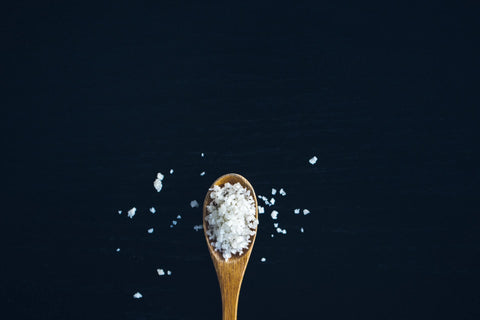
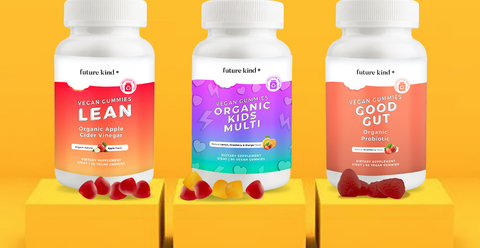
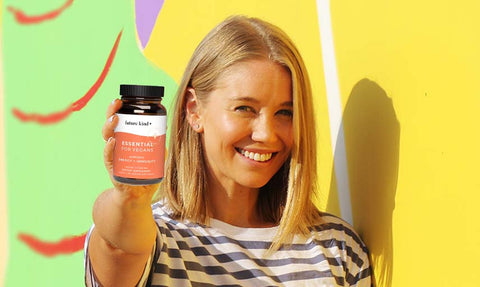
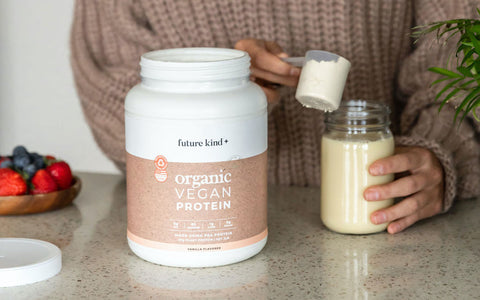
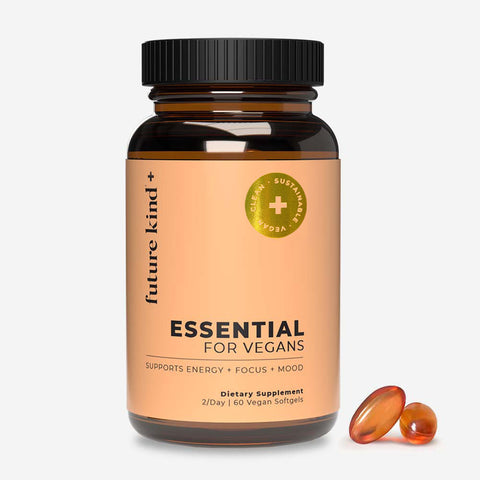
Comments (0)
There are no comments for this article. Be the first one to leave a message!